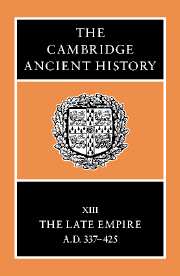Book contents
- Frontmatter
- PART I CHRONOLOGICAL OVERVIEW
- PART II GOVERNMENT AND INSTITUTIONS
- PART III THE EMPIRE: ECONOMY AND SOCIETY
- PART IV FOREIGN RELATIONS AND THE BARBARIAN WORLD
- PART V Religion
- 18 Polytheist religion and philosophy
- 19 Orthodoxy and heresy from the death of Constantine to the eve of the first council of Ephesus
- 20 Asceticism: pagan and Christian
- 21 Christianization and religious conflict
- PART VI ART AND CULTURE
- BIBLIOGRAPHY
- Index
- Map 1: The Roman empire in the late fourth century a.d.
- Map 2: Gaul and the German frontier
- Map 3: The Balkans and the Danube region
- Map 6: Asia Minor and the eastern provinces
- References
19 - Orthodoxy and heresy from the death of Constantine to the eve of the first council of Ephesus
from PART V - Religion
Published online by Cambridge University Press: 28 March 2008
- Frontmatter
- PART I CHRONOLOGICAL OVERVIEW
- PART II GOVERNMENT AND INSTITUTIONS
- PART III THE EMPIRE: ECONOMY AND SOCIETY
- PART IV FOREIGN RELATIONS AND THE BARBARIAN WORLD
- PART V Religion
- 18 Polytheist religion and philosophy
- 19 Orthodoxy and heresy from the death of Constantine to the eve of the first council of Ephesus
- 20 Asceticism: pagan and Christian
- 21 Christianization and religious conflict
- PART VI ART AND CULTURE
- BIBLIOGRAPHY
- Index
- Map 1: The Roman empire in the late fourth century a.d.
- Map 2: Gaul and the German frontier
- Map 3: The Balkans and the Danube region
- Map 6: Asia Minor and the eastern provinces
- References
Summary
‘Heresy’ is derived from a transliteration of the ordinary Greek word for choice, hairesis. The word came to mean a ‘school of thought’, a philosophical tendency. But already in some New Testament texts it acquired a pejorative overtone for a sect or faction (e.g. Acts 5.17; 24.5; 24.15; 26.5; 1 Cor. 11.19). The term, especially after Justin in the mid second century, could indicate both a deviationist doctrine and the group asserting it. From the beginning there was a considerable degree of diversity among different Christian congregations. Debate became warm when deviation from affirmations regarded by the main body as the norm appeared to threaten the possibility of salvation or to deny the goodness and power of the Creator manifest in the visible creation. The community felt threatened in essential matters of belief if one denied either the need or the possibility of redemption for humanity, or if one denied either the full humanity of the Redeemer or the full presence in him of the supreme divine power. In the fourth and fifth centuries many controversies turned on one or other of these issues.
Before Constantine's time ecclesiastical writers had come to see that some affirmations were more central than others; that there are areas where dissent can be without prejudice to these central affirmations; moreover, that one must distinguish between a heresy and a mistake. Strictly, no one could properly be deemed a heretic unless he or she was a baptized believer. The original sense of the word hairesis came through in the recognition that a heretic was someone deliberately, indeed obstinately, setting aside affirmations felt to be of high importance to the community.
- Type
- Chapter
- Information
- The Cambridge Ancient History , pp. 561 - 600Publisher: Cambridge University PressPrint publication year: 1997
References
- 3
- Cited by

